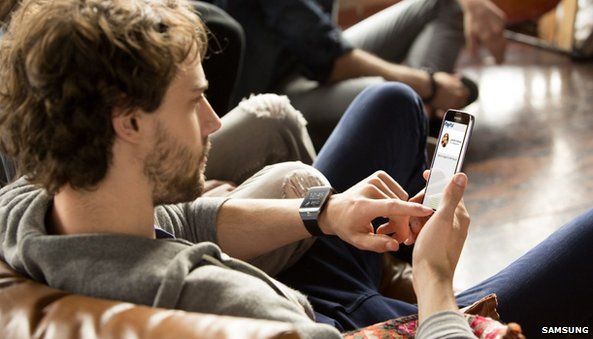Samsung adds biometrics to latest Galaxy smartphone
- Published

The next iteration of Samsung's Galaxy smartphone range will feature biometric security, the company has announced.
In a similar way to Apple's iPhone 5, the main button on the front of the device doubles as a fingerprint scanner used to unlock the device.
The S5, which is water and dust-resistant will be available in April.
South Korea-based Samsung, the market leader in smartphone sales worldwide, also claimed to have made the "world's fastest" auto-focusing camera.
In addition to two smartwatches announced on Sunday - the Gear and Gear 2 Neo - Samsung also added the Gear Fit, a smartband that is focused on fitness.
Security focus
Security has been a major theme at Mobile World Congress in Barcelona.
Earlier on Monday, the Blackphone, made by Silent Circle, was launched. It included a range of specialised security apps offering encrypted communication.
And for Samsung, it was security features that provoked applause from those in attendance at its characteristically-flamboyant launch event at Mobile World Congress in Barcelona.
As well as unlocking the device, the fingerprint scanner will be used to power payments. Samsung has partnered with Paypal to offer payment-by-finger.
The scanner is also able to enable "private mode", a way of storing sensitive information accessible only by using the scanner.
"Consumers already worried about the security of established payment mechanisms are likely to view a new technology and process with suspicion," commented Eden Zoller, principal analyst at Ovum.
"On the positive side, Samsung is a hugely popular smartphone brand with global reach, while PayPal is a trusted payments service provider. This is a powerful combination."
Another feature impressing the crowd was the device's black-and-white mode - designed to save battery life by limiting the power used by the screen and disabling all but essential features such as text and calls.
"Samsung appears to have cherry-picked the most crowd-pleasing features available from other manufacturers," said Ernest Doku from uSwitch.com.
"A fingerprint ID sensor and an attractive gold model like Apple's iPhone 5s, a water and dust-resistant body like Sony's Xperia Z2, and photography credentials to challenge the best from Nokia."
No Tizen
Samsung is by far the dominant player in smartphones globally.
According to Strategy Analytics, 452 million Samsung devices were shipped in 2013 - far greater than Apple's 153 million.
But sales of the S5's predecessor, the S4, were seen as disappointing compared to the growth achieved by the S3.
The company also faces a growing threat from emerging Chinese manufacturers such as Xiaomi, ZTE and Lenovo.
Some had speculated before the event that Samsung would eventually drop Google's Android software in favour of a fledgling system known as Tizen.
However, while the company's new smartwatches will use Tizen rather than Android, the flagship smartphone is, for now, sticking with Google's system.
This is likely to be of relief to the search giant - it is Samsung's enormous market share that makes Android the most popular mobile operating system.
"What perhaps is the most interesting aspect of the device is what Samsung did not announce, effectively putting to bed a number of rumours," said Ovum analyst Nick Dillon.
"These included suggestions at both ends of the scale that that the device would be running Tizen OS and that it would be using a 'pure' Google version of Android.
"That it has neither tells us both that Tizen is unlikely to see a major handset launch this year and that Google and Samsung are still operating at arm's length."